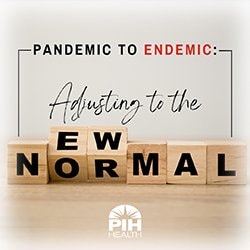Pandemic to Endemic: Adjusting to the New Normal

When the COVID-19 virus was labeled a pandemic in early 2020, our world was turned upside down, causing disruption and upheaval to life as we once knew it. Today, even though the virus is far from being gone, life has returned to some sense of normalcy.
The current state of the COVID-19 virus can best be described as on its way to reaching endemic status. “Endemic does not mean the end of the disease. Instead, it means living with, and often managing, a disease that has not been, or cannot be, stamped out,” says Rosalio Lopez MD, senior vice president, chief medical officer and chief strategy officer at PIH Health. “COVID-19 will still be around, but it's moving toward a level that is not causing significant disruption in our daily lives.”
Hospitals are not as impacted. Schools and businesses are functioning and not having to be closed down. However, the possibility of contracting the virus and getting sick remains and, because of that, safety continues to be a top concern.
Adapting to Life with COVID-19
There are many viruses that are endemic in our community, including influenza (the flu), rhinovirus (the common cold), and respiratory syncytial virus (RSV). These viruses circulate and get people sick, but they don’t stop us from living our lives. That’s what we’re facing with COVID-19, too. We live with endemics by protecting ourselves as much as possible. Control measures (like testing, treatments, and vaccinations) and establishing safety precautions all help to keep endemic diseases in check.
In the case of COVID-19, that includes getting vaccinated and boosted as recommended. Immunity from vaccinations, as well as from natural infection, wanes over time and does not guarantee that you won’t catch the virus. But data shows vaccines do a good job of protecting against serious illness, hospitalization, and death so they’re still worth it.
Having treatment options available also helps us deal with endemics. People at high risk who contract COVID-19 may be advised to take a drug like Paxlovid to reduce symptoms and lower the chance of serious illness. As different variants of the virus emerge and our knowledge about the disease increases, other treatment options will likely be available in the future.
Making sure we are taking safety precautions in high-risk environments and situations is also vital to managing COVID-19 and preventing its spread in our communities. “PIH Health continues to follow Los Angeles County and Centers for Disease Control and Prevention health guidelines at our hospitals, urgent care centers, and medical offices for the safety and well-being of all our patients and health providers,” says Dr. Lopez. “As COVID-19 numbers in the region decline, some safety requirements and certain restrictions that remain in place in our medical facilities are slowly being loosened. Above all, we continue to maintain the highest standards of infection prevention and disinfection practices to ensure patient and visitor safety.”
While we would like to imagine a world where COVID-19 doesn’t exist anymore, that is not our reality. That means we have to find ways to go about our daily lives in as close to a normal fashion as possible while taking steps to avoid illness.
“If the COVID-19 pandemic taught us anything, it was that life often brings us things we don’t expect, so we should take every opportunity to take control of our health by staying up to date on immunizations and taking necessary safety precautions,” says Dr. Lopez.
The following tips can help protect you from being severely impacted by COVID-19:
- Continue to get boosted. Updated vaccine boosters are now available to better protect against newer Omicron variants. Although it’s not known yet how often boosters will be recommended, it’s likely we’ll have to continue to get them regularly. This is something we already do with other viruses. For example, every year flu shots are recommended. Other vaccines require periodic boosters as well.
- Take precautions in high-risk situations. The same steps that protected you during the pandemic will help you now. Steer clear of anyone you know who has COVID-19 or those who appear to have symptoms. Consider wearing masks when you are in large crowds, especially indoors. Wash your hands often.
- Boost your immunity. Take steps to keep your immune system strong. Filling your plate with healthy foods, exercising regularly, getting enough sleep, not smoking, and reducing stress are all ways to boost your immunity so you can better fight COVID-19 or any other illness you may get. As an added bonus, you’ll improve your overall health in the process.